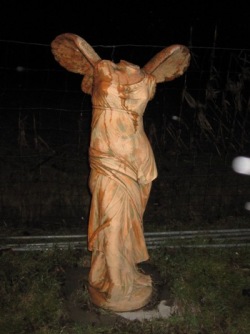The Asking ourselves the reason of things Knowledge
The elements of the Sorcerer's Crucible: Sixth part
by Claudio Simeoni
(Italian Pagans' Federation)
Federazione Pagana
Programme broadcast on 22st May 1997
First we'll add another element in the Sorcerer's Crucible: the knowledge. Not the knowledge as an object, the knowledge as Minerva: the knowledge as the divine which grows inside us and protects reason.
We said that the construction process of the Sorcerer's Stick (with the suspension of the internal dialogue, the suspension of the judgement, the sceptical attitude) limited the reason through which we enter in relation with the surrounding world. We also said that the introduction of the attention related to senses shocked reason disarming it of the educational conditioning which defended it in facing the everyday life. Now reason has to face anyway the everyday life and we have to give it new means.
The first of those means we put into the crucible is the knowledge by which facing the everyday life.
It's the knowledge as self-expression of the individual which is built by the Human Being's custom of asking itself the reason of things!
We force reason to ask itself: why does the phenomenon we face exist? How did it take place? What phenomena produce it? We accept what we find out with suspension of judgement, but we always ask ourselves the reason of things. And the reason of the reason of things, and the reason of the reason of the reason of things and so on.
This brings us to continuously modify our necessity judgement.
Human Beings constructed judgements as a product of the Educational Conditioning and they resorted to the necessity judgement when they were practicing the suspension of the judgement while building the Sorcerer's Stick. Now the necessity judgement measures our deepness in asking ourselves the reason of things.
In the crucible we put the asking ourselves the reason of things. By this activity, while we stir into the Crucible, we go into the necessity judgement thoroughly and the necessity judgement becomes our truth. The reason's truth, the truth which measures our ability in asking ourselves the reason of things.
When we get rid of the imposed Educational Conditioning, we face the everyday life asking ourselves the reason of things and the reason of the reason of things. In this way, we exert our will and determinations.
We give what we meet out to all those who ask themselves the reason of things. We expose what is ours so that everyone could use it to enrich his/her research, apart from the fact that he/she could accept the reason we give or find another reason of that thing (which would be better).
The reason increases its knowledge by expanding itself.
By this activity, we become Minerva and call Minerva to help us along our path: the mixing in the Crucible!
Someone could ask us: what are you and Francesco doing, speaking into a microphone about Witchcraft, Polytheistic Paganism and Magic, when only few people can understand what you're saying, while many others think that what you're saying is incomprehensible because they're doing nothing to change the point of view from which they face their life?
The answer is: we're doing this with controlled madness.
The concept of controlled madness has been introduced by Castaneda: it's an expression to wrap the individual's actions.
In the next programme we'll speak about the controlled madness, both as a deceit with which the reason hides its aim, as Castaneda said, and as the luminous body's aim, when it acts through the reason's elements.
1997
|
Write only in Italian, please! Claudio Simeoni Mechanic Apprentice Sorcerer Keeper of the Antichrist P.le Parmesan 8 30175 Marghera Venice Italy Tel. 3277862784 E-mail: claudiosimeoni@libero.it
|


